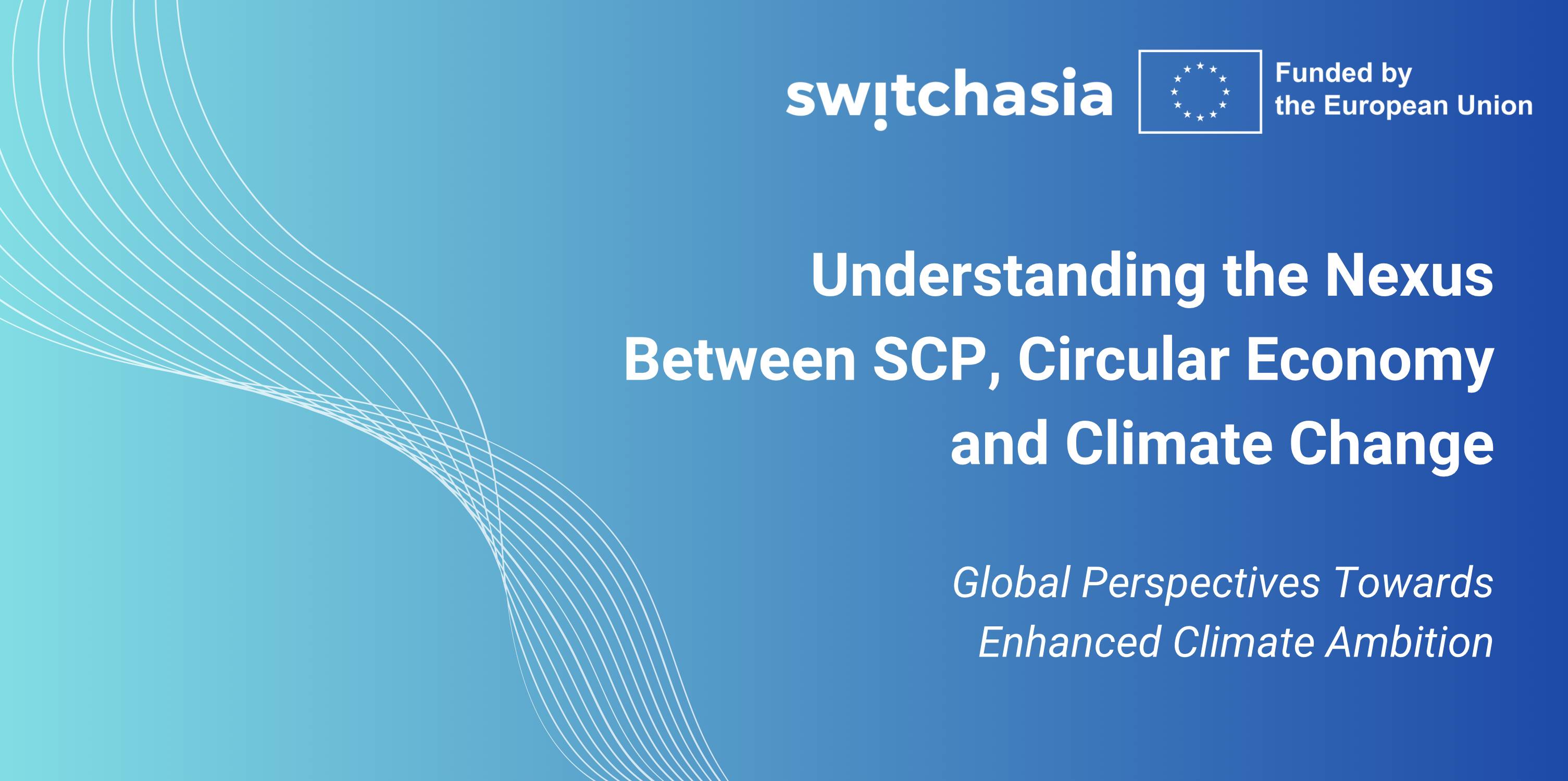
When: 26 October 2023 I Time: 16:00-17:30 (Bangkok) I Watch the video HERE
Background
The SWITCH-Asia Policy Support Component (PSC) has a primary objective of advancing Sustainable Consumption and Production (SCP) efforts by amplifying and integrating SCP policies across 42 countries. These countries are spread across a wide geographical region encompassing the Middle East, Central Asia, South Asia, Southeast Asia, and the Pacific. The SWITCH-Asia PSC is built upon the solid foundation of the successful SWITCH-Asia programme, which has a history of providing effective technical assistance. Furthermore, it establishes crucial connections with the SWITCH-Asia grants component and aligns with the programmes and priorities of European Union Delegations (EUDs). The PSC's adaptable and demand-driven interventions, coupled with its mandate to encourage cooperation, enhance networking, and create a platform for knowledge exchange, position it favorably to address the triple planetary crises and meet international commitments. These commitments encompass the Sustainable Development Goals (SDGs) and the Paris Agreement, underscoring the Program's commitment to a sustainable future.
Unsustainable consumption and production patterns lie at the core of the triple planetary crises encompassing climate change, biodiversity loss, and pollution. The scientific community has firmly established the link between climate change and material consumption. According to the Global Resource Outlook 2019 report of the International Resource Panel (IRP), our global population has doubled, material extraction has tripled, and gross domestic product has quadrupled during the past five decades. In the last twenty years, there has been a noticeable acceleration in the extraction and utilization of natural resources, which have been responsible for about half of the effects we observe in climate change. However, it's essential to recognize that the linkages between materials and climate change remain largely uncharted territory within the realm of climate change strategies and actions.
The 6th Assessment report from the Intergovernmental Panel on Climate Change (IPCC) has once again sounded the alarm for global policymakers, emphasizing the urgent need to prevent the Earth's temperature from reaching dangerous levels. The collective global inaction in addressing the challenges posed by climate change has compelled humanity to pursue more rapid and ambitious climate actions. The recently published Global Stocktake (GST) report, as part of the Paris Agreement under the United Nations Framework Convention on Climate Change (UNFCCC), has concluded that, based on current Nationally Determined Contributions (NDCs), there is a significant emissions gap of 20.3–23.9 Gt CO2 equivalent by 2030 to stay on track with limiting global warming to 1.5 °C. The trajectory of this shortfall in ambition is pointing towards a potential temperature rise of 2.8°C by the end of the century. Even if the current NDC targets are fully implemented, it can only limit the temperature increase to 2.4-2.6°C by the century's end, as highlighted in the 2022 UNEP Emission Gap Report.
The UNFCCC GST report also underscores that achieving net-zero emissions will vary from country to country, necessitating a comprehensive, nationwide effort in all countries to chart pathways towards net-zero CO2 or greenhouse gas (GHG) emissions. While these steps are critical for GHG mitigation, it's essential to ensure a broader "social transformation" to guarantee that investments in these initial measures yield the desired results. Given the pressing need for increased ambition in climate action, it becomes crucial to leverage all available avenues without compromising sustainable development. Sustainable Consumption and Production (SCP) and Circular Economy emerge as compelling options for harnessing climate change co-benefits.
The SWITCH-Asia PSC has recognized that there are instances in various countries where Sustainable Consumption and Production (SCP) and Circular Economy (CE) elements have been incorporated into their existing Nationally Determined Contributions (NDC) targets. This positive development indicates room for further enhancement and expansion. Currently, the programme is executing a brief Technical Advisory (TA) initiative across six South Asian nations. The objective is to gain insights into the present status and the potential for integrating SCP/CE principles into their NDC commitments.
Webinar Objectives
The proposed webinar is designed to serve as a platform for sharing global insights and experiences at the intersection of climate change and SCP/CE. Its aim is to facilitate knowledge exchange and lessons learned in this critical area.
Three main objectives:
1. To identify and deliberate on the current global understanding on the linkages between climate change and SCP.
2. To identify the opportunities to integrate SCP/CE into climate actions to harness synergies and co-benefits.
3. To identify the challenges and solutions in deploying SCP/CE strategies to enhance climate ambitions.
The webinar is structured, comprising two main components: key presentations and a panel discussion, each bearing profound significance in addressing the intertwined issues of resource consumption and climate change.
The key presentations will cover the scientific aspects of resource consumption and climate change. The recent scientific findings and the projections highlighted in the Global Emissions Gap Report, the Global Resource Outlook, and the first report of the Global Stock Take (GST) of the Paris Agreement will be the basis for these key presentations. It is expected to set the background for the discussion on the potential options for integrating these two aspects and finding potential synergetic solutions to tackle both crises.
The Panel discussion will build on the key presentation and bring different angles of the problems and potential solutions. It will discuss the challenges and opportunities to integrate climate actions with sustainable consumption and production, experiences in different countries of Asia and the Pacific on integrating climate change and SCP, the potential for reflecting the SCP action in NDCs, other challenges and opportunities.
Key highlights
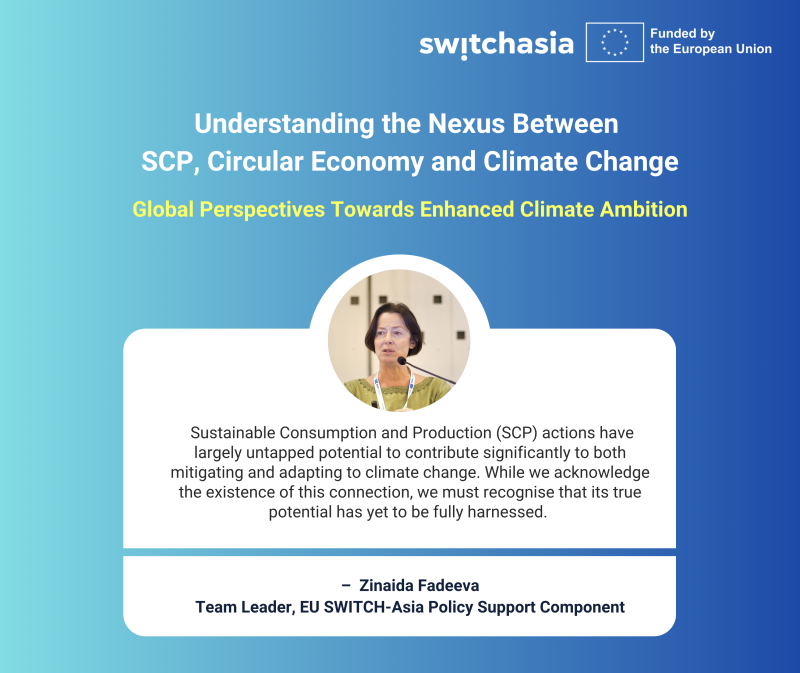
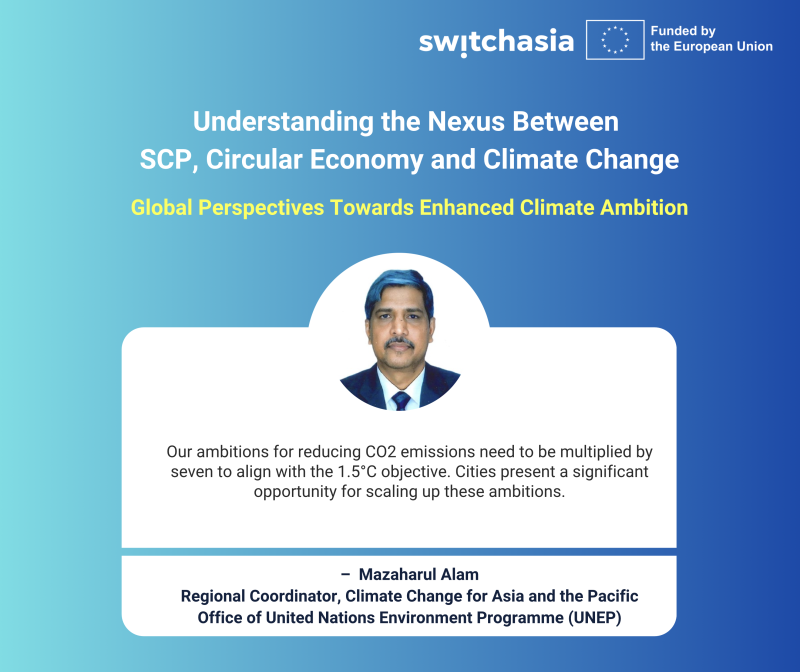
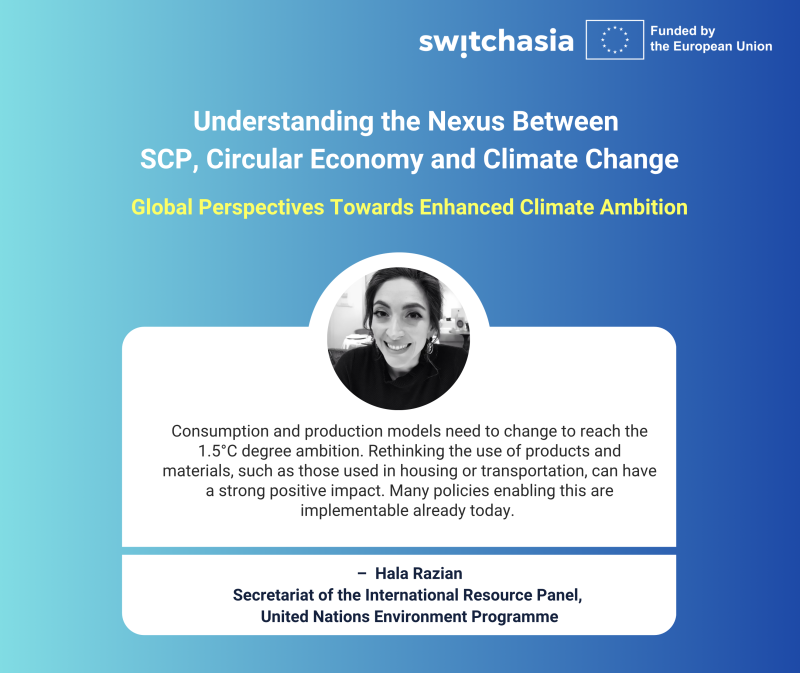
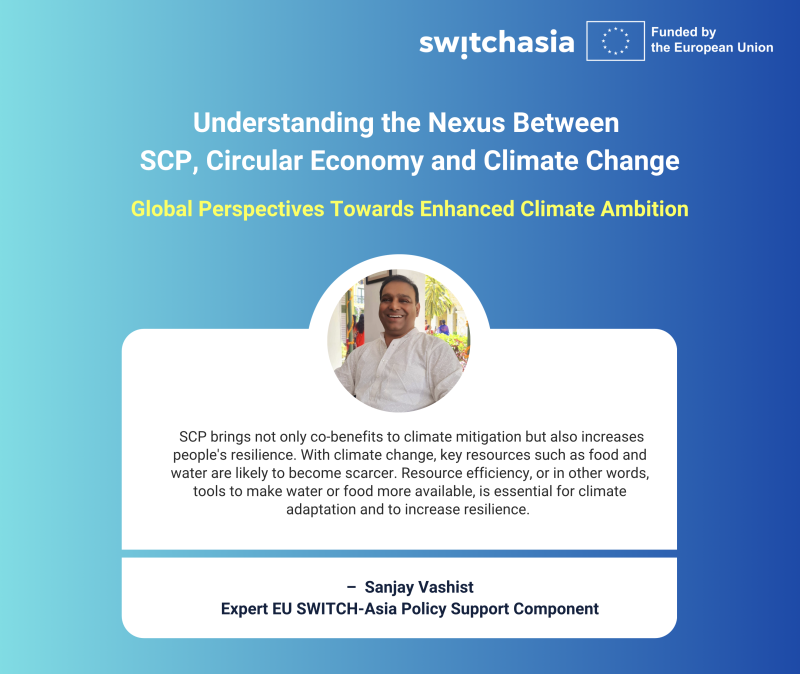
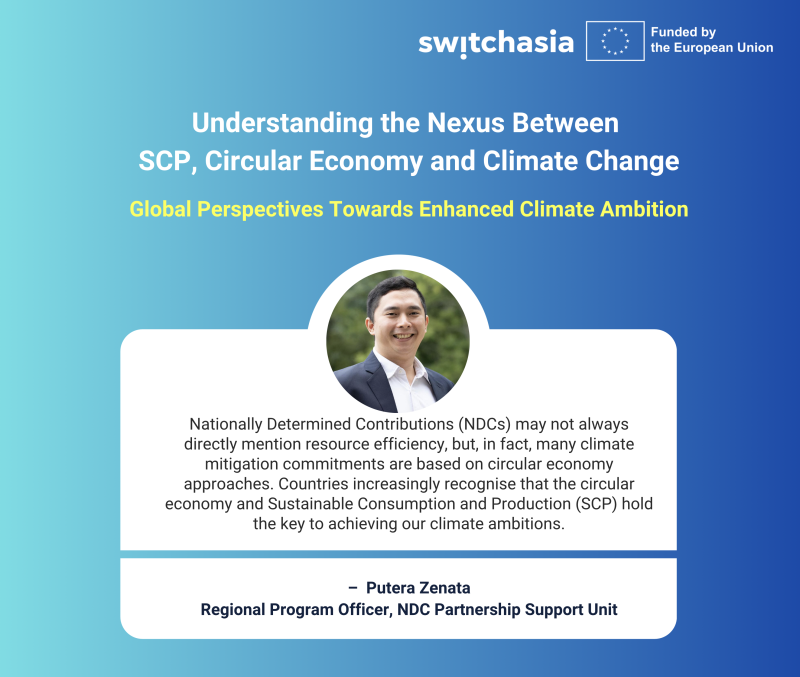
Expected Outcomes
- Interaction and exchange of ideas between two constituencies.
- Mainstream Sustainable Consumption and Production (SCP) discussion in the Climate Change discourse.
- Map opportunities from SCP as climate ambition for the consideration of national governments.
- Identify challenges and bilateral partnerships to overcome them.
Speakers

Sanjay Vashist, Expert EU SWITCH-Asia Policy Support Component
Sanjay is serving as an Expert of the SWITCH-Asia PSC on the Technical Advisory on SCP-linked NDC in South Asia. He has over 20 years of experience in climate change and UNFCCC climate negotiations. He is also serving as the Executive Director of Climate Action Network South Asia. Prior to that he worked with TERI as a Climate Change expert. He also worked as International Coordinator for Climate Action Network International (CANI) in Bonn, Germany coordinating the activities of ENGOs network also acting as focal point for ENGOs constituency of observers under UNFCCC. Academically he is a ‘Forester’ with Graduation and Post Graduation in Forestry from India. He completed his Master in Agro Forestry from Gujarat Agriculture University and Graduation in Forestry from Konkan Krishi Vidhyapeeth, Maharastra.
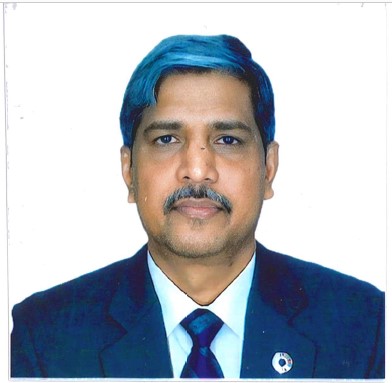
Mazaharul Alam, Regional Coordinator, Climate Change for Asia and the Pacific Office of United Nations Environment Programme (UNEP)
Mozaharul Alam has obtained his M.Sc. Degree in Geography in 1989 from Jahangirnagar University in Bangladesh. His areas of specialization are in adaptation and low carbon development to climate change, integrating climate change into development planning, and international negotiations. He joined the United Nations Environment Programme (UNEP) as a Regional Coordinator, Climate Change for Asia and the Pacific Office in 2009, providing strategic and political guidance to design and implement climate actions in the region. He also served the Ministry of Environment and Forests, Government of Bangladesh as a National Project Coordinator and successfully undertaken inclusive process and formulated National Adaptation Programme of Action (NAPA). He attended climate change negotiations for more than a decade and coordinated adaptation group of G77 and China during 2007 to 2009. He worked as Lead Author for Working Group II for IPCC Fifth Assessment Report.

Putera Zenata (Zen), Regional Program Officer, NDC Partnership Support Unit
Zen is a Regional Program Officer at the NDC Partnership Support Unit. He supports the implementation of the Partnership’s activities related to all the stages of country engagement and knowledge strategies in Eastern Europe, Asia, and the Pacific. Prior to joining the NDC Partnership, Zen worked at UN Climate Change where he supported the Regional Collaboration Centres and organized the 2019 Regional Climate Weeks in Thailand, Ghana, and Brazil. He has also worked at the Ministry of Education in Singapore, championing climate change education and capacity-building in the country and surrounding region.
 Hala Razian, United Nations Environment Programme – Secretariat of the International Resource Panel
Hala Razian, United Nations Environment Programme – Secretariat of the International Resource Panel
Hala Razian has worked with the United Nations Environment Programme – Secretariat of the International Resource Panel since 2016, and with the UN system since 2013, including at the Economic and Social Commission for Asia and the Pacific. She leads work on the IRP’s flagship report, the Global Resources Outlook, the second edition to be released at UNEA-6 in 2024. She is the focal point for intergovernmental and regional bodies at the IRP Secretariat, including the UNFCCC. She holds a master’s degree in Development Studies from the School of Oriental and African Studies, University College London, and a master’s degree in Environmental Management from Macquarie University Australia. Before the UN, she has worked in academia, non-governmental organizations and private sector consultancies on sustainable development and environmental sustainability related issues.
Agenda
|
Time |
Session |
|
16:00 - 16:10 |
Welcome and Introduction Dr. Zinaida Fadeeva, Team Leader, SWITCH-Asia PSC |
|
16:10 - 16:30 |
The urgency to enhance the climate ambition. Highlights of the IPCC 6th Assessment Report and the Emissions Gap Report Mozaharul Alam, Regional Climate Change Coordinator, UNEP Asia Pacific Regional Office |
|
16:30 - 16:50 |
The dilemma of resource extraction and use. Highlights of the Global Resource Outlook, International Resource Panel Hala Razian, International Resource Panel |
|
16:50 - 17:15 |
Moderated Panel Discussion Moderator: Ranga Pallawala, Key Expert on Climate Change, SWITCH-Asia Panellists Putera Zenata, Regional Program Officer for Asia Pacific and Eastern Europe at the NDC Partnership Support UnitNDC -Partnership Mozaharul Alam, Regional Climate Change Coordinator, UNEP Asia Pacific Regional Office Sanjay Vashist, Expert, SWITCH-Asia PSC Hala Razian, International Resource Panel |
|
17:15 - 17:30 |
Q&A Wrap up |


